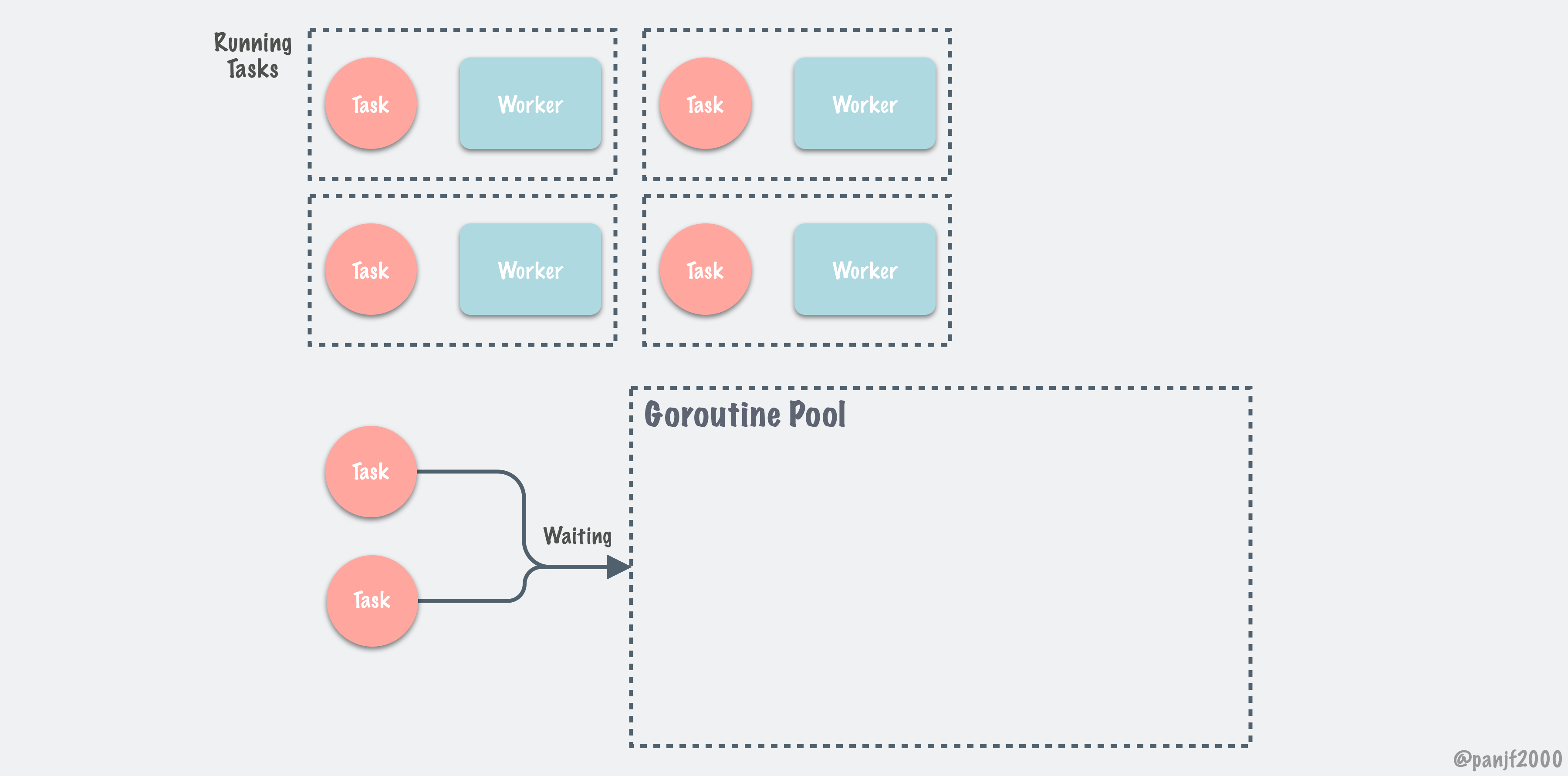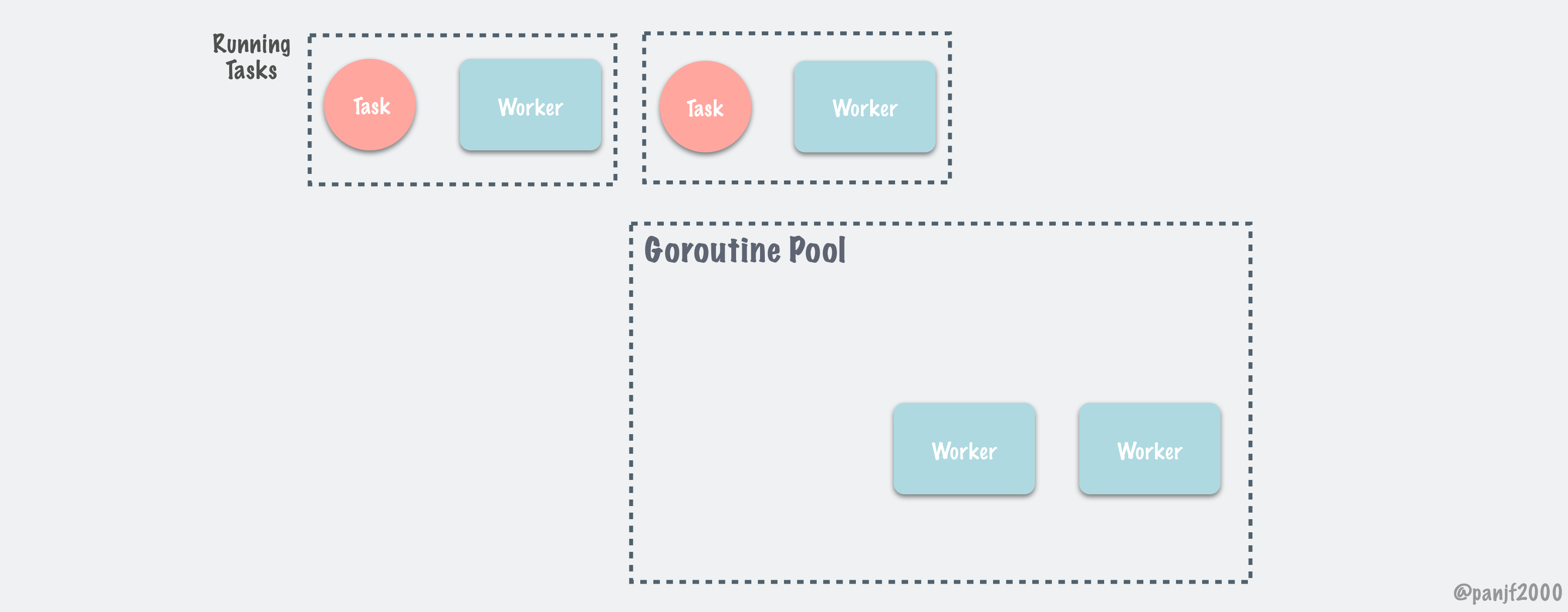 A goroutine pool for Go
A goroutine pool for Go







English | [中文](README_ZH.md)
## 📖 Introduction
Library `ants` implements a goroutine pool with fixed capacity, managing and recycling a massive number of goroutines, allowing developers to limit the number of goroutines in your concurrent programs.
## 🚀 Features:
- Managing and recycling a massive number of goroutines automatically
- Purging overdue goroutines periodically
- Abundant APIs: submitting tasks, getting the number of running goroutines, tuning the capacity of the pool dynamically, releasing the pool, rebooting the pool, etc.
- Handle panic gracefully to prevent programs from crash
- Efficient in memory usage and it may even achieve ***higher performance*** than unlimited goroutines in Golang
- Nonblocking mechanism
- Preallocated memory (ring buffer, optional)
## 💡 How `ants` works
### Flow Diagram

### Activity Diagrams




## 🧰 How to install
### For `ants` v1
``` powershell
go get -u github.com/panjf2000/ants
```
### For `ants` v2 (with GO111MODULE=on)
```powershell
go get -u github.com/panjf2000/ants/v2
```
## 🛠 How to use
Just imagine that your program starts a massive number of goroutines, resulting in a huge consumption of memory. To mitigate that kind of situation, all you need to do is to import `ants` package and submit all your tasks to a default pool with fixed capacity, activated when package `ants` is imported:
``` go
package main
import (
"fmt"
"sync"
"sync/atomic"
"time"
"github.com/panjf2000/ants/v2"
)
var sum int32
func myFunc(i interface{}) {
n := i.(int32)
atomic.AddInt32(&sum, n)
fmt.Printf("run with %d\n", n)
}
func demoFunc() {
time.Sleep(10 * time.Millisecond)
fmt.Println("Hello World!")
}
func main() {
defer ants.Release()
runTimes := 1000
// Use the common pool.
var wg sync.WaitGroup
syncCalculateSum := func() {
demoFunc()
wg.Done()
}
for i := 0; i < runTimes; i++ {
wg.Add(1)
_ = ants.Submit(syncCalculateSum)
}
wg.Wait()
fmt.Printf("running goroutines: %d\n", ants.Running())
fmt.Printf("finish all tasks.\n")
// Use the pool with a function,
// set 10 to the capacity of goroutine pool and 1 second for expired duration.
p, _ := ants.NewPoolWithFunc(10, func(i interface{}) {
myFunc(i)
wg.Done()
})
defer p.Release()
// Submit tasks one by one.
for i := 0; i < runTimes; i++ {
wg.Add(1)
_ = p.Invoke(int32(i))
}
wg.Wait()
fmt.Printf("running goroutines: %d\n", p.Running())
fmt.Printf("finish all tasks, result is %d\n", sum)
if sum != 499500 {
panic("the final result is wrong!!!")
}
// Use the MultiPool and set the capacity of the 10 goroutine pools to unlimited.
// If you use -1 as the pool size parameter, the size will be unlimited.
// There are two load-balancing algorithms for pools: ants.RoundRobin and ants.LeastTasks.
mp, _ := ants.NewMultiPool(10, -1, ants.RoundRobin)
defer mp.ReleaseTimeout(5 * time.Second)
for i := 0; i < runTimes; i++ {
wg.Add(1)
_ = mp.Submit(syncCalculateSum)
}
wg.Wait()
fmt.Printf("running goroutines: %d\n", mp.Running())
fmt.Printf("finish all tasks.\n")
// Use the MultiPoolFunc and set the capacity of 10 goroutine pools to (runTimes/10).
mpf, _ := ants.NewMultiPoolWithFunc(10, runTimes/10, func(i interface{}) {
myFunc(i)
wg.Done()
}, ants.LeastTasks)
defer mpf.ReleaseTimeout(5 * time.Second)
for i := 0; i < runTimes; i++ {
wg.Add(1)
_ = mpf.Invoke(int32(i))
}
wg.Wait()
fmt.Printf("running goroutines: %d\n", mpf.Running())
fmt.Printf("finish all tasks, result is %d\n", sum)
if sum != 499500*2 {
panic("the final result is wrong!!!")
}
}
```
### Functional options for ants pool
```go
// Option represents the optional function.
type Option func(opts *Options)
// Options contains all options which will be applied when instantiating a ants pool.
type Options struct {
// ExpiryDuration is a period for the scavenger goroutine to clean up those expired workers,
// the scavenger scans all workers every `ExpiryDuration` and clean up those workers that haven't been
// used for more than `ExpiryDuration`.
ExpiryDuration time.Duration
// PreAlloc indicates whether to make memory pre-allocation when initializing Pool.
PreAlloc bool
// Max number of goroutine blocking on pool.Submit.
// 0 (default value) means no such limit.
MaxBlockingTasks int
// When Nonblocking is true, Pool.Submit will never be blocked.
// ErrPoolOverload will be returned when Pool.Submit cannot be done at once.
// When Nonblocking is true, MaxBlockingTasks is inoperative.
Nonblocking bool
// PanicHandler is used to handle panics from each worker goroutine.
// if nil, panics will be thrown out again from worker goroutines.
PanicHandler func(interface{})
// Logger is the customized logger for logging info, if it is not set,
// default standard logger from log package is used.
Logger Logger
}
// WithOptions accepts the whole options config.
func WithOptions(options Options) Option {
return func(opts *Options) {
*opts = options
}
}
// WithExpiryDuration sets up the interval time of cleaning up goroutines.
func WithExpiryDuration(expiryDuration time.Duration) Option {
return func(opts *Options) {
opts.ExpiryDuration = expiryDuration
}
}
// WithPreAlloc indicates whether it should malloc for workers.
func WithPreAlloc(preAlloc bool) Option {
return func(opts *Options) {
opts.PreAlloc = preAlloc
}
}
// WithMaxBlockingTasks sets up the maximum number of goroutines that are blocked when it reaches the capacity of pool.
func WithMaxBlockingTasks(maxBlockingTasks int) Option {
return func(opts *Options) {
opts.MaxBlockingTasks = maxBlockingTasks
}
}
// WithNonblocking indicates that pool will return nil when there is no available workers.
func WithNonblocking(nonblocking bool) Option {
return func(opts *Options) {
opts.Nonblocking = nonblocking
}
}
// WithPanicHandler sets up panic handler.
func WithPanicHandler(panicHandler func(interface{})) Option {
return func(opts *Options) {
opts.PanicHandler = panicHandler
}
}
// WithLogger sets up a customized logger.
func WithLogger(logger Logger) Option {
return func(opts *Options) {
opts.Logger = logger
}
}
```
`ants.Options`contains all optional configurations of the ants pool, which allows you to customize the goroutine pool by invoking option functions to set up each configuration in `NewPool`/`NewPoolWithFunc`method.
### Customize limited pool
`ants` also supports customizing the capacity of the pool. You can invoke the `NewPool` method to instantiate a pool with a given capacity, as follows:
``` go
p, _ := ants.NewPool(10000)
```
### Submit tasks
Tasks can be submitted by calling `ants.Submit(func())`
```go
ants.Submit(func(){})
```
### Tune pool capacity in runtime
You can tune the capacity of `ants` pool in runtime with `Tune(int)`:
``` go
pool.Tune(1000) // Tune its capacity to 1000
pool.Tune(100000) // Tune its capacity to 100000
```
Don't worry about the contention problems in this case, the method here is thread-safe (or should be called goroutine-safe).
### Pre-malloc goroutine queue in pool
`ants` allows you to pre-allocate the memory of the goroutine queue in the pool, which may get a performance enhancement under some special certain circumstances such as the scenario that requires a pool with ultra-large capacity, meanwhile, each task in goroutine lasts for a long time, in this case, pre-mallocing will reduce a lot of memory allocation in goroutine queue.
```go
// ants will pre-malloc the whole capacity of pool when you invoke this method
p, _ := ants.NewPool(100000, ants.WithPreAlloc(true))
```
### Release Pool
```go
pool.Release()
```
### Reboot Pool
```go
// A pool that has been released can be still used once you invoke the Reboot().
pool.Reboot()
```
## ⚙️ About sequence
All tasks submitted to `ants` pool will not be guaranteed to be addressed in order, because those tasks scatter among a series of concurrent workers, thus those tasks would be executed concurrently.
## 👏 Contributors
Please read our [Contributing Guidelines](CONTRIBUTING.md) before opening a PR and thank you to all the developers who already made contributions to `ants`!
 ## 📄 License
The source code in `ants` is available under the [MIT License](/LICENSE).
## 📚 Relevant Articles
- [Goroutine 并发调度模型深度解析之手撸一个高性能 goroutine 池](https://taohuawu.club/high-performance-implementation-of-goroutine-pool)
- [Visually Understanding Worker Pool](https://medium.com/coinmonks/visually-understanding-worker-pool-48a83b7fc1f5)
- [The Case For A Go Worker Pool](https://brandur.org/go-worker-pool)
- [Go Concurrency - GoRoutines, Worker Pools and Throttling Made Simple](https://twin.sh/articles/39/go-concurrency-goroutines-worker-pools-and-throttling-made-simple)
## 🖥 Use cases
### business corporations
Trusted by the following corporations/organizations.
If you're also using `ants` in production, please help us enrich this list by opening a pull request.
### open-source software
The open-source projects below do concurrent programming with the help of `ants`.
- [gnet](https://github.com/panjf2000/gnet): A high-performance, lightweight, non-blocking, event-driven networking framework written in pure Go.
- [milvus](https://github.com/milvus-io/milvus): An open-source vector database for scalable similarity search and AI applications.
- [nps](https://github.com/ehang-io/nps): A lightweight, high-performance, powerful intranet penetration proxy server, with a powerful web management terminal.
- [siyuan](https://github.com/siyuan-note/siyuan): SiYuan is a local-first personal knowledge management system that supports complete offline use, as well as end-to-end encrypted synchronization.
- [osmedeus](https://github.com/j3ssie/osmedeus): A Workflow Engine for Offensive Security.
- [jitsu](https://github.com/jitsucom/jitsu/tree/master): An open-source Segment alternative. Fully-scriptable data ingestion engine for modern data teams. Set-up a real-time data pipeline in minutes, not days.
- [triangula](https://github.com/RH12503/triangula): Generate high-quality triangulated and polygonal art from images.
- [teler](https://github.com/kitabisa/teler): Real-time HTTP Intrusion Detection.
- [bsc](https://github.com/binance-chain/bsc): A Binance Smart Chain client based on the go-ethereum fork.
- [jaeles](https://github.com/jaeles-project/jaeles): The Swiss Army knife for automated Web Application Testing.
- [devlake](https://github.com/apache/incubator-devlake): The open-source dev data platform & dashboard for your DevOps tools.
- [matrixone](https://github.com/matrixorigin/matrixone): MatrixOne is a future-oriented hyper-converged cloud and edge native DBMS that supports transactional, analytical, and streaming workloads with a simplified and distributed database engine, across multiple data centers, clouds, edges and other heterogeneous infrastructures.
- [bk-bcs](https://github.com/TencentBlueKing/bk-bcs): BlueKing Container Service (BCS, same below) is a container management and orchestration platform for the micro-services under the BlueKing ecosystem.
- [trueblocks-core](https://github.com/TrueBlocks/trueblocks-core): TrueBlocks improves access to blockchain data for any EVM-compatible chain (particularly Ethereum mainnet) while remaining entirely local.
- [openGemini](https://github.com/openGemini/openGemini): openGemini is an open-source,cloud-native time-series database(TSDB) that can be widely used in IoT, Internet of Vehicles(IoV), O&M monitoring, and industrial Internet scenarios.
- [AdGuardDNS](https://github.com/AdguardTeam/AdGuardDNS): AdGuard DNS is an alternative solution for tracker blocking, privacy protection, and parental control.
- [WatchAD2.0](https://github.com/Qihoo360/WatchAD2.0): WatchAD2.0 是 360 信息安全中心开发的一款针对域安全的日志分析与监控系统,它可以收集所有域控上的事件日志、网络流量,通过特征匹配、协议分析、历史行为、敏感操作和蜜罐账户等方式来检测各种已知与未知威胁,功能覆盖了大部分目前的常见内网域渗透手法。
- [vanus](https://github.com/vanus-labs/vanus): Vanus is a Serverless, event streaming system with processing capabilities. It easily connects SaaS, Cloud Services, and Databases to help users build next-gen Event-driven Applications.
- [trpc-go](https://github.com/trpc-group/trpc-go): A pluggable, high-performance RPC framework written in Golang.
- [motan-go](https://github.com/weibocom/motan-go): a remote procedure call (RPC) framework for the rapid development of high-performance distributed services.
#### All use cases:
- [Repositories that depend on ants/v2](https://github.com/panjf2000/ants/network/dependents?package_id=UGFja2FnZS0yMjY2ODgxMjg2)
- [Repositories that depend on ants/v1](https://github.com/panjf2000/ants/network/dependents?package_id=UGFja2FnZS0yMjY0ODMzNjEw)
If you have `ants` integrated into projects, feel free to open a pull request refreshing this list of use cases.
## 🔋 JetBrains OS licenses
`ants` has been being developed with GoLand under the **free JetBrains Open Source license(s)** granted by JetBrains s.r.o., hence I would like to express my thanks here.
## 📄 License
The source code in `ants` is available under the [MIT License](/LICENSE).
## 📚 Relevant Articles
- [Goroutine 并发调度模型深度解析之手撸一个高性能 goroutine 池](https://taohuawu.club/high-performance-implementation-of-goroutine-pool)
- [Visually Understanding Worker Pool](https://medium.com/coinmonks/visually-understanding-worker-pool-48a83b7fc1f5)
- [The Case For A Go Worker Pool](https://brandur.org/go-worker-pool)
- [Go Concurrency - GoRoutines, Worker Pools and Throttling Made Simple](https://twin.sh/articles/39/go-concurrency-goroutines-worker-pools-and-throttling-made-simple)
## 🖥 Use cases
### business corporations
Trusted by the following corporations/organizations.
If you're also using `ants` in production, please help us enrich this list by opening a pull request.
### open-source software
The open-source projects below do concurrent programming with the help of `ants`.
- [gnet](https://github.com/panjf2000/gnet): A high-performance, lightweight, non-blocking, event-driven networking framework written in pure Go.
- [milvus](https://github.com/milvus-io/milvus): An open-source vector database for scalable similarity search and AI applications.
- [nps](https://github.com/ehang-io/nps): A lightweight, high-performance, powerful intranet penetration proxy server, with a powerful web management terminal.
- [siyuan](https://github.com/siyuan-note/siyuan): SiYuan is a local-first personal knowledge management system that supports complete offline use, as well as end-to-end encrypted synchronization.
- [osmedeus](https://github.com/j3ssie/osmedeus): A Workflow Engine for Offensive Security.
- [jitsu](https://github.com/jitsucom/jitsu/tree/master): An open-source Segment alternative. Fully-scriptable data ingestion engine for modern data teams. Set-up a real-time data pipeline in minutes, not days.
- [triangula](https://github.com/RH12503/triangula): Generate high-quality triangulated and polygonal art from images.
- [teler](https://github.com/kitabisa/teler): Real-time HTTP Intrusion Detection.
- [bsc](https://github.com/binance-chain/bsc): A Binance Smart Chain client based on the go-ethereum fork.
- [jaeles](https://github.com/jaeles-project/jaeles): The Swiss Army knife for automated Web Application Testing.
- [devlake](https://github.com/apache/incubator-devlake): The open-source dev data platform & dashboard for your DevOps tools.
- [matrixone](https://github.com/matrixorigin/matrixone): MatrixOne is a future-oriented hyper-converged cloud and edge native DBMS that supports transactional, analytical, and streaming workloads with a simplified and distributed database engine, across multiple data centers, clouds, edges and other heterogeneous infrastructures.
- [bk-bcs](https://github.com/TencentBlueKing/bk-bcs): BlueKing Container Service (BCS, same below) is a container management and orchestration platform for the micro-services under the BlueKing ecosystem.
- [trueblocks-core](https://github.com/TrueBlocks/trueblocks-core): TrueBlocks improves access to blockchain data for any EVM-compatible chain (particularly Ethereum mainnet) while remaining entirely local.
- [openGemini](https://github.com/openGemini/openGemini): openGemini is an open-source,cloud-native time-series database(TSDB) that can be widely used in IoT, Internet of Vehicles(IoV), O&M monitoring, and industrial Internet scenarios.
- [AdGuardDNS](https://github.com/AdguardTeam/AdGuardDNS): AdGuard DNS is an alternative solution for tracker blocking, privacy protection, and parental control.
- [WatchAD2.0](https://github.com/Qihoo360/WatchAD2.0): WatchAD2.0 是 360 信息安全中心开发的一款针对域安全的日志分析与监控系统,它可以收集所有域控上的事件日志、网络流量,通过特征匹配、协议分析、历史行为、敏感操作和蜜罐账户等方式来检测各种已知与未知威胁,功能覆盖了大部分目前的常见内网域渗透手法。
- [vanus](https://github.com/vanus-labs/vanus): Vanus is a Serverless, event streaming system with processing capabilities. It easily connects SaaS, Cloud Services, and Databases to help users build next-gen Event-driven Applications.
- [trpc-go](https://github.com/trpc-group/trpc-go): A pluggable, high-performance RPC framework written in Golang.
- [motan-go](https://github.com/weibocom/motan-go): a remote procedure call (RPC) framework for the rapid development of high-performance distributed services.
#### All use cases:
- [Repositories that depend on ants/v2](https://github.com/panjf2000/ants/network/dependents?package_id=UGFja2FnZS0yMjY2ODgxMjg2)
- [Repositories that depend on ants/v1](https://github.com/panjf2000/ants/network/dependents?package_id=UGFja2FnZS0yMjY0ODMzNjEw)
If you have `ants` integrated into projects, feel free to open a pull request refreshing this list of use cases.
## 🔋 JetBrains OS licenses
`ants` has been being developed with GoLand under the **free JetBrains Open Source license(s)** granted by JetBrains s.r.o., hence I would like to express my thanks here.
 ## 💰 Backers
Support us with a monthly donation and help us continue our activities.
## 💰 Backers
Support us with a monthly donation and help us continue our activities.
 ## 💎 Sponsors
Become a bronze sponsor with a monthly donation of $10 and get your logo on our README on GitHub.
## 💎 Sponsors
Become a bronze sponsor with a monthly donation of $10 and get your logo on our README on GitHub.
 ## ☕️ Buy me a coffee
> Please be sure to leave your name, GitHub account, or other social media accounts when you donate by the following means so that I can add it to the list of donors as a token of my appreciation.
## ☕️ Buy me a coffee
> Please be sure to leave your name, GitHub account, or other social media accounts when you donate by the following means so that I can add it to the list of donors as a token of my appreciation.


 ## 🔋 Sponsorship
## 🔋 Sponsorship

 A goroutine pool for Go
A goroutine pool for Go
























